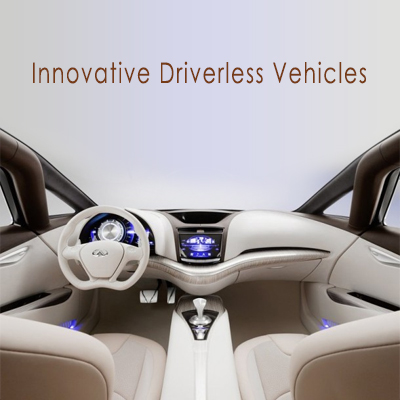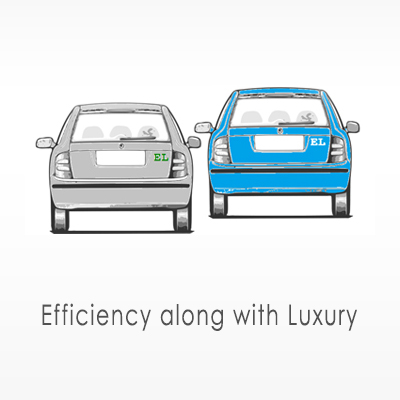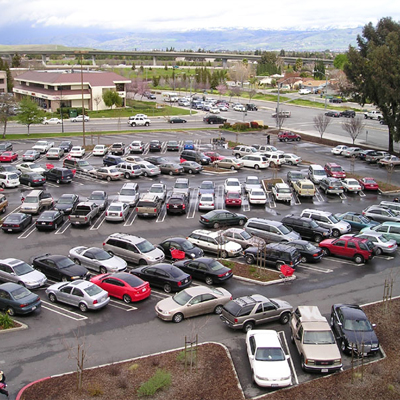Innovative Driverless Vehicles

In today's world everything turning to be automated and this is considered to be the competitive edge for the product or the process. Most importantly systems are giving space to make them automated. Since the artificial intelligence has come up and doing miracles in different industry sectors at commercial and individual level, the expectations of the industry and market raised and the demand is been realized by the manufacturers. The artificial intelligence in the automotives has set the expectations more high for driverless cars.
In automotives the trend is bringing up many changes, innovations and autonomous driving cars are no more science fictions. The recent result is Google's Driverless Car that stood as a revolution in the field. However, driverless or autonomous cars footage is since 1939, when GM's sponsored Norman Bel Geddes's Futurama was showcased at the 1939 World's Fair. This was followed by Mercedes-Benz robotic van and DARPA-funded Autonomous Land Vehicle in the year 1980, twin robot vehicles VaMP and Vita-2 of Daimler-Benz and Ernst Dickmanns of UniBwM during 1994 and in the year 1995, Dickmanns re-engineered autonomous S-Class Mercedes-Benz. Meanwhile, Carnegie Mellon University Navlab and University of Parma also came up with the projects which achieved 98.2% and 94% of the time the car was in fully automatic mode.
US Government has funded for military efforts that are known as Demo I & Demo III for US Army and Demo II for DARPA. In the 2001, Demo III proved the ability of unmanned ground vehicles to navigate miles of difficult off-road terrain. An intercontinental trip, which was the longest autonomous vehicle trip of four driverless electric vans for 13,000 km from Italy to China took place and reached the Shanghai Expo on 28 October, 2010. All these milestones show the significance that autonomous or driverless cars have in the market, irrespective of commercial, security, defense or personal end purposes.
Motivation for these trends
Current average vehicle is having more advanced computer work implanted compared to the Apollo 11 landed on moon in 1969. So, the average vehicles are employed with sensors to do automatic Parallel Park, warn drivers if another car is in the driver's blind spot, distance control assist to automatically slowdown a vehicle when an object is close ahead, and lane departure technology that redirects a car if it begins to veer out of its lane and so on.
Recently released project, Google Driverless Car is equipped with an array of sensors on the car that monitors the surroundings, the road and traffic conditions at 20 times a second, rigid safety systems along with cameras, radar and laser sensors, enabling them to monitor the lead vehicle and other vehicles on the road. While the information is assessed by the computer intelligence to decide whether the car should speed up, slow down or change lanes. Another advantage of this car is that the computer doesn't get distracted by incoming phone calls or roadside advertisements like humans. This vehicle is based on the Toyota Prius that can't break the speed limit without their extra involvement, for instance. Mr. Bruce Breslow, Director - Nevada's Department of Motor Vehicles, approved license for this car in May, 2012 and said that "I sat in the back seat first, looking at the laptop that shows what the vehicle is seeing. My apprehension disappeared after about five seconds. Once I felt confident that the car could see better than I could, they allowed me to get behind the wheel."
The core advantages of the Google Driverless Car are
- »Right configuration and sensors on this car makes it automatically calculate the optimal distance to begin slowing down before a stop sign or turn and also be able to carefully modulate speed and acceleration rates to optimize use of the engine in use and ultimately results less fuel consumption.
- »360 degree cameras monitoring reduces the traffic jams because merging, stopping, and turning would become much more precise.
- »Lower auto insurance rates for the statistics the self-driving car has proved as a safety feature during long trips.
- »Optimized routing have access to databases of information on speed limits for each road, and potentially at some point on the timing of each traffic light and this gives options to the car to reach the passenger to a destination with a minimum of stops and slow-ups.
- »Less maintenance is the result of driving the car respectably that last longer and require fewer repairs.
BMW's Track Trainer with a modified 3 Series built on the standard production of the 330i model was also tested. The car used
- »a built-in GPS
- »a signal booster.
- »accompanying repeater for increasing bandwidth and accuracy down to the centimeter.
- »a custom map of the track.
In the next iteration BMW 5 Series was showcased with ConnectedDrive Connect (CDC) system that allows the driver to keep hands off the wheel of the 5 Series while speeding down on the Autobahn. So, with the CDC system, the car can brake, accelerate and pass other vehicles while analyzing the traffic conditions by using radar, cameras, laser scanners, and ultrasound distance sensors to get the information it needs.
Technology Company Intel, car manufacturers BMW, Ford, Toyota and General Motors are on the mission looking for ways to improve the driverless motor car they already developed and these efforts increasingly adding some more automation in their new R&D labs. These manufactures have already made huge advances in the past decade and much of achievements are already applied in commercial vehicles. While, a convoy of self driving cars for the first time in the world are experimented by Volvo Car Corporation on a public motorway in Spain at normal traffic. This Volvo project is named as SARTRE (Safe Road Trains for the Environment) that has many other research partners.
The race to roll out autonomous or driverless cars took faster pace in the recent times with Google's Diverless car that gained license from Nevada Department of Motor Vehicles and the three Volvo saloons cruised the highways of Spain. Business plans are framed on the concept and manufacturers are looking for reliable suppliers. So, this driverless car has opened the horizon of business opportunities and technical challenges to other industry sectors too, like camera manufacturers, sensor manufacturers, safety systems manufacturers, custom computers, software's and others.



